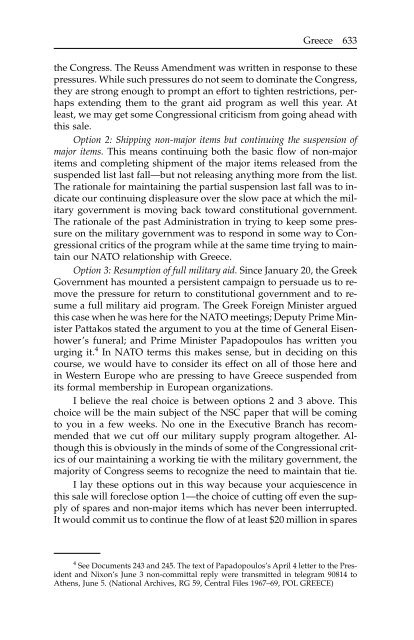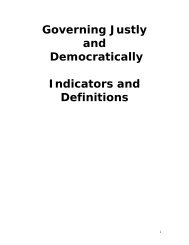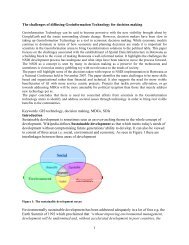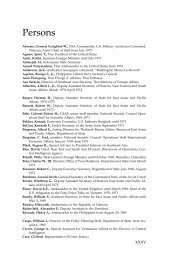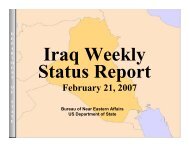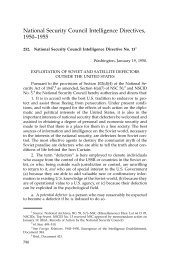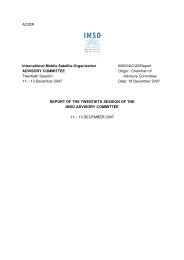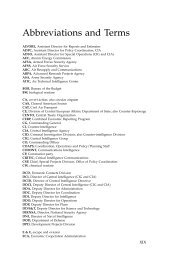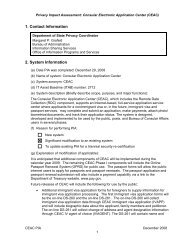Greece - US Department of State
Greece - US Department of State
Greece - US Department of State
Create successful ePaper yourself
Turn your PDF publications into a flip-book with our unique Google optimized e-Paper software.
<strong>Greece</strong> 633<br />
the Congress. The Reuss Amendment was written in response to these<br />
pressures. While such pressures do not seem to dominate the Congress,<br />
they are strong enough to prompt an effort to tighten restrictions, perhaps<br />
extending them to the grant aid program as well this year. At<br />
least, we may get some Congressional criticism from going ahead with<br />
this sale.<br />
Option 2: Shipping non-major items but continuing the suspension <strong>of</strong><br />
major items. This means continuing both the basic flow <strong>of</strong> non-major<br />
items and completing shipment <strong>of</strong> the major items released from the<br />
suspended list last fall—but not releasing anything more from the list.<br />
The rationale for maintaining the partial suspension last fall was to indicate<br />
our continuing displeasure over the slow pace at which the military<br />
government is moving back toward constitutional government.<br />
The rationale <strong>of</strong> the past Administration in trying to keep some pressure<br />
on the military government was to respond in some way to Congressional<br />
critics <strong>of</strong> the program while at the same time trying to maintain<br />
our NATO relationship with <strong>Greece</strong>.<br />
Option 3: Resumption <strong>of</strong> full military aid. Since January 20, the Greek<br />
Government has mounted a persistent campaign to persuade us to remove<br />
the pressure for return to constitutional government and to resume<br />
a full military aid program. The Greek Foreign Minister argued<br />
this case when he was here for the NATO meetings; Deputy Prime Minister<br />
Pattakos stated the argument to you at the time <strong>of</strong> General Eisenhower’s<br />
funeral; and Prime Minister Papadopoulos has written you<br />
urging it. 4 In NATO terms this makes sense, but in deciding on this<br />
course, we would have to consider its effect on all <strong>of</strong> those here and<br />
in Western Europe who are pressing to have <strong>Greece</strong> suspended from<br />
its formal membership in European organizations.<br />
I believe the real choice is between options 2 and 3 above. This<br />
choice will be the main subject <strong>of</strong> the NSC paper that will be coming<br />
to you in a few weeks. No one in the Executive Branch has recommended<br />
that we cut <strong>of</strong>f our military supply program altogether. Although<br />
this is obviously in the minds <strong>of</strong> some <strong>of</strong> the Congressional critics<br />
<strong>of</strong> our maintaining a working tie with the military government, the<br />
majority <strong>of</strong> Congress seems to recognize the need to maintain that tie.<br />
I lay these options out in this way because your acquiescence in<br />
this sale will foreclose option 1—the choice <strong>of</strong> cutting <strong>of</strong>f even the supply<br />
<strong>of</strong> spares and non-major items which has never been interrupted.<br />
It would commit us to continue the flow <strong>of</strong> at least $20 million in spares<br />
4 See Documents 243 and 245. The text <strong>of</strong> Papadopoulos’s April 4 letter to the President<br />
and Nixon’s June 3 non-committal reply were transmitted in telegram 90814 to<br />
Athens, June 5. (National Archives, RG 59, Central Files 1967–69, POL GREECE)


